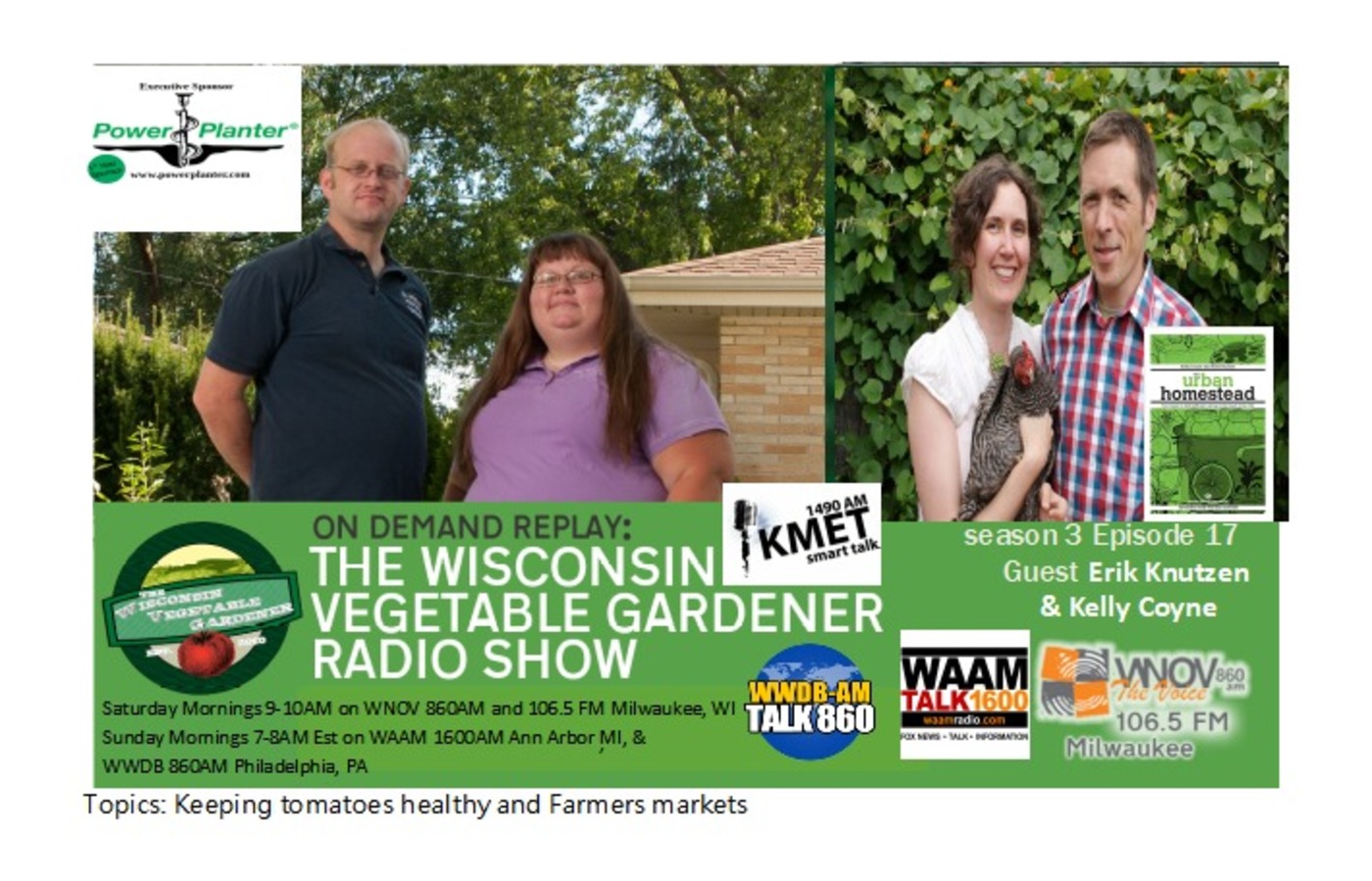S3E17 Keeping Tomatoes Healthy all season long, Value of Bees Author Erik Knute TWVG radio show
- Author
- The Gardening with Joey & Holly radio show (The Wisconsin vegetable gardener)
- Published
- Mon 24 Jun 2019
- Episode Link
- https://www.podomatic.com/podcasts/thewisconsinvegetablegardenerpodcast/episodes/2019-06-24T04_00_00-07_00
Replay of The Wisconsin Vegetable Gardener Radio Show from 6-22-19
Heard on 860AM WNOV & W293cx 106.5FM Milwaukee, WI Saturday mornings 9-10AM CST
Heard on WAAM 1600 AM Ann Arbor, MI Sundays 7-8AM est
Heard on WWDB 860 AM Philadelphia, PA Sundays 7-8AM est
Heard on KMET 1490 AM Tuesdays 9 - 10 AM pst Banning, CA
listen here during show hours for your station:
WNOV https://tinyurl.com/y8lwd922
WWDB: https://wwdbam.com/
WAAM https://tinyurl.com/p68cvft
KMET https://www.kmet1490am.com/
Check out https://thewisconsinvegetablegardener.com/
In segment 1 Joey and Holly talk about how to keep your tomatoes healthy all season long and producing
Keeping your tomato plants healthy
Trim around the base
Mulch
Whole grain yellow cornmeal
Water consistently
trellis/cage
Harvest frequently
Look for problems
Leaf discoloration
In segment to Joey and Holly talk about the importance and value of Bees
Understanding bees
Bees help pollinate
Help make more bees
It is estimated that one third of the food that we consume each day relies on pollination mainly by bees
4000 species of bees in north america
Bees are not native to north america - settlers brought them over
Found on every continent except antartica
Bees are at a high risk for extinction - The researchers found that the American Bumblebee's area of occurrence has decreased by about 70 percent and its relative abundance fell by 89 percent from 2007-2016 compared to 1907-2006.
Loss of habitat (aka conversion of prairie into farmland) and insecticides are thought to be the primary causes of the great bee disappearing act.
Bumblebees are among the most important pollinators of crops such as blueberries, cranberries, and clover, and almost the only insect pollinators of tomatoes
In Segment 3 Joey and Holly talk with their guest author Erik Knutzen of https://www.rootsimple.com/
Kelly Coyne and Erik Knutzen live in the heart of Los Angeles, in a little bungalow set on a 1/12 acre lot where almost all of their land is devoted to growing edible or otherwise useful plants and trees. Their obsessions include bees, bikes, beer, chickens, healthy cities, healing herbs, simple living and good food. In short, everything DIY! They are the authors of The Urban Homestead: Your Guide to Self-Sufficient Living in the Heart of the City and Making It: Radical Home Ec for a Post-Consumer World.
1. Many people don’t want to have a compost bin or compost area because they don’t have enough space or they don’t like the thought of it, but there is worm composting – why would you recommend worm composting for people who don’t want to commit to a compost heap?
2. You don’t care for lawns (neither do we) – why don’t you like them or think they really make sense?
3. You keep your home cleaning products really simple and basic – what do you use to clean your home with?
4. You consider yourselves radical home economists – why do you call yourselves that and what does it mean to you?
5. You like to keep things simple and low-tech when it comes to living as urban homesteaders – why do you do so?
6. Where can we find out more about you?
In segment 4 Joey and Holly answer gardeners questions
1.What can I plant in place after I harvest my garlic?
A: Tomatoes , potatoes, cucumbers, peas, turnips, rutabagas
2. Q:My tomatoes look normal but the turn black on the bottom.what's wrong ?
The bottom of the fruit is black?
A: This would be blossom in root rot it is due to the fact that there's not enough water in the swell in order for the plant to pick up the necessary calcium that is required to properly develop the fruit what you want to do is just water the plant keep the soil to a damn consistency such as a sponge and water regularly to prevent the soil from drying out and then preventing the plant from up taking the calcium that is needed to develop the fruit if you begin (continued)
